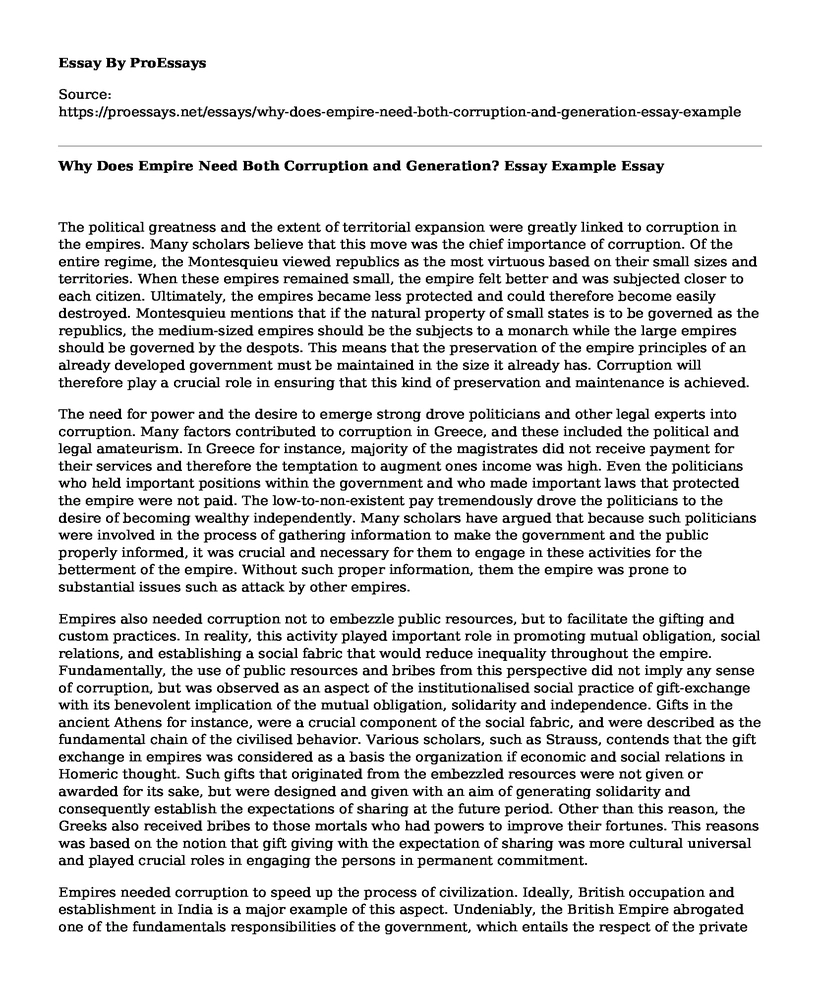The political greatness and the extent of territorial expansion were greatly linked to corruption in the empires. Many scholars believe that this move was the chief importance of corruption. Of the entire regime, the Montesquieu viewed republics as the most virtuous based on their small sizes and territories. When these empires remained small, the empire felt better and was subjected closer to each citizen. Ultimately, the empires became less protected and could therefore become easily destroyed. Montesquieu mentions that if the natural property of small states is to be governed as the republics, the medium-sized empires should be the subjects to a monarch while the large empires should be governed by the despots. This means that the preservation of the empire principles of an already developed government must be maintained in the size it already has. Corruption will therefore play a crucial role in ensuring that this kind of preservation and maintenance is achieved.
The need for power and the desire to emerge strong drove politicians and other legal experts into corruption. Many factors contributed to corruption in Greece, and these included the political and legal amateurism. In Greece for instance, majority of the magistrates did not receive payment for their services and therefore the temptation to augment ones income was high. Even the politicians who held important positions within the government and who made important laws that protected the empire were not paid. The low-to-non-existent pay tremendously drove the politicians to the desire of becoming wealthy independently. Many scholars have argued that because such politicians were involved in the process of gathering information to make the government and the public properly informed, it was crucial and necessary for them to engage in these activities for the betterment of the empire. Without such proper information, them the empire was prone to substantial issues such as attack by other empires.
Empires also needed corruption not to embezzle public resources, but to facilitate the gifting and custom practices. In reality, this activity played important role in promoting mutual obligation, social relations, and establishing a social fabric that would reduce inequality throughout the empire. Fundamentally, the use of public resources and bribes from this perspective did not imply any sense of corruption, but was observed as an aspect of the institutionalised social practice of gift-exchange with its benevolent implication of the mutual obligation, solidarity and independence. Gifts in the ancient Athens for instance, were a crucial component of the social fabric, and were described as the fundamental chain of the civilised behavior. Various scholars, such as Strauss, contends that the gift exchange in empires was considered as a basis the organization if economic and social relations in Homeric thought. Such gifts that originated from the embezzled resources were not given or awarded for its sake, but were designed and given with an aim of generating solidarity and consequently establish the expectations of sharing at the future period. Other than this reason, the Greeks also received bribes to those mortals who had powers to improve their fortunes. This reasons was based on the notion that gift giving with the expectation of sharing was more cultural universal and played crucial roles in engaging the persons in permanent commitment.
Empires needed corruption to speed up the process of civilization. Ideally, British occupation and establishment in India is a major example of this aspect. Undeniably, the British Empire abrogated one of the fundamentals responsibilities of the government, which entails the respect of the private property and the laws that protect the private individuals. British officials were observed extorting monies from the local Indian leaders and involving themselves in the theft of the Indian property, in addition to the manipulation of government loans. As a supporter of Adam Smiths political economy, Burke agrees that the emergence of the commercial economies with pacified, law played crucial roles in governing and controlling the civil societies in Britain and Western Europe, and this represented a progressive historical transformation and the civilization process. At the time of British occupation and empire establishment, India had not demonstrated a concrete development like other Europe nations. In this sense, a primary phase in ensuring that they were civilised was rude intrinsic worth of the savage life. The commercial economies development brought people increased peoples contact and mutual dependence. This move did not destroy the civic virtue but displaced stressful, and conflicts, which were aimed for civility, mutual enablement and human flourishing.
Cite this page
Why Does Empire Need Both Corruption and Generation? Essay Example. (2021, Jun 23). Retrieved from https://proessays.net/essays/why-does-empire-need-both-corruption-and-generation-essay-example
If you are the original author of this essay and no longer wish to have it published on the ProEssays website, please click below to request its removal:
- Essay Sample on Effective Leadership Practices
- Team Work and Differences in Culture Essay
- Different Forms of Government Presented by Aristotle and Confucius Essay
- Research Paper on Wilmington, NC: History, Beauty, and Splendor
- Regulatory Takings: A Constitutional Right of Private Property Owners - Essay Sample
- Essay Example on Risky Ventures: Ignoring the Consequences of Bureaucracy
- Free Report Example: Small Business Administration







